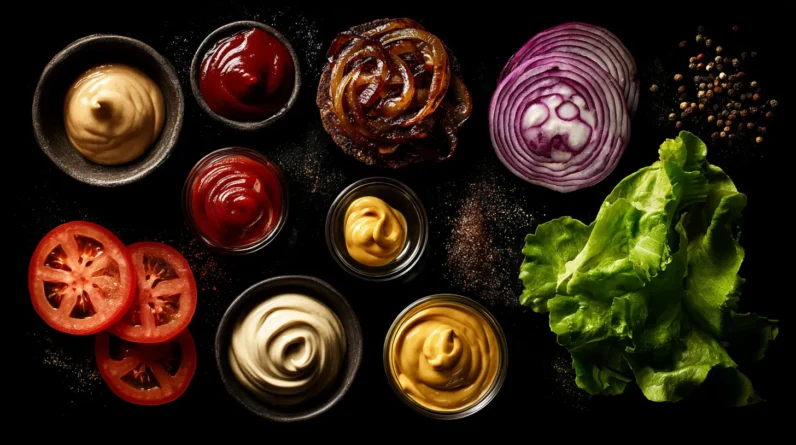
Discover the delectable delights of a healthier burger with wise cheese choices.
Cheese, a classic staple in the world of burgers, can be a flavorful addition to your diet when chosen wisely. In this article, we explore the impact of cheese on your health and provide insights into different types of cheese.
We also offer healthier alternatives to traditional cheeses and guide you on incorporating cheese into a balanced diet. Get ready to savor the taste of a guilt-free burger experience.
Key Takeaways
– Cheese can contribute to weight gain due to its high calorie and fat content.
– Certain types of cheese, like blue cheese and feta, may have anti-inflammatory properties and reduce the risk of cardiovascular diseases.
– Nut-based, tofu-based, and vegetable-based cheeses are healthier alternatives to traditional cheese, as they are lower in fat and calories.
– When consuming cheese, practice portion control and choose cheeses that are lower in fat and sodium, such as feta, mozzarella, and goat cheese.
The Impact of Cheese on Your Health
Cheese consumption has been linked to various health effects, including both positive and negative impacts. When it comes to weight gain, cheese can be a contributing factor due to its high calorie and fat content. While cheese is a good source of protein and calcium, consuming it in excess can lead to an increase in calorie intake, potentially leading to weight gain. It is important to be mindful of portion sizes and choose lower-fat options when incorporating cheese into your diet.
On the other hand, research suggests that moderate cheese consumption may have a positive role in heart health. Cheese contains nutrients like calcium, vitamin D, and potassium, which are beneficial for maintaining healthy blood pressure levels. Additionally, some studies have shown that certain types of cheese, such as fermented cheeses like blue cheese and feta, may have anti-inflammatory properties and can help reduce the risk of cardiovascular diseases.
It is important to note that moderation is key when it comes to cheese consumption. Incorporating cheese into a balanced diet can provide valuable nutrients, but excessive consumption can have negative effects on weight and overall health. It is recommended to choose lower-fat options, control portion sizes, and consult with a healthcare professional or registered dietitian for personalized advice on incorporating cheese into a healthy eating plan.
Understanding Different Types of Cheese
When considering the nutritional value of different options, it is important to understand the distinctions between various types of cheese. One key factor to consider is cheese aging. Aging cheese is a process that enhances its flavor and texture, but it can also affect its nutritional profile. Generally, the longer a cheese is aged, the lower its moisture content and the higher its fat content becomes. This means that aged cheeses tend to be higher in calories and fat compared to fresher cheeses. However, aged cheeses like Parmesan and Gouda also tend to have higher levels of calcium and protein, making them a nutritious choice for those looking to incorporate more nutrients into their diet.
Another important aspect to consider when choosing cheese is cheese pairing. Different cheeses pair well with different foods and beverages, and this can affect the overall nutritional value of the meal. For example, pairing a strong-flavored cheese like blue cheese with fruits and whole grain crackers can provide a balanced combination of flavors and nutrients. Similarly, pairing a milder cheese like mozzarella with fresh vegetables and lean proteins can create a healthy and satisfying meal option.
Healthier Alternatives to Traditional Cheeses
Incorporating plant-based alternatives into your meals can provide a healthier option for those looking to reduce their consumption of traditional cheeses. Plant-based options offer a variety of benefits, including lower fat content and reduced risk of certain health conditions.
Here are some healthier alternatives to traditional cheeses:
Nut-based cheeses: Made from nuts like cashews or almonds, these cheeses are rich in healthy fats and provide a creamy texture. They can be used as spreads or melted for a cheesy topping on dishes.
Tofu-based cheeses: Tofu can be blended with nutritional yeast, spices, and other ingredients to create a cheese-like consistency. Tofu is a low-fat, high-protein option that can be used in various recipes, such as lasagna or grilled cheese sandwiches.
Vegetable-based cheeses: Vegetables like cauliflower and carrots can be used to create a cheesy flavor and texture. These vegetable-based cheeses are often lower in fat and calories compared to traditional cheese.
These plant-based options into your meals can help you reduce your intake of saturated fat and cholesterol, while still enjoying the delicious taste of cheese. Experimenting with these low-fat alternatives can open up a world of new flavors and dishes, allowing you to make wise choices for your diet while still enjoying the freedom to indulge in cheesy goodness.
Incorporating Cheese Into a Balanced Diet
Balancing the inclusion of various food groups in your daily meals is essential for maintaining a well-rounded and nutritious diet. When it comes to incorporating cheese into a balanced diet, it is important to consider healthy cheese options and practice portion control.
When choosing cheese, opt for varieties that are lower in fat and sodium. Some healthy cheese options include feta, mozzarella, and goat cheese. These cheeses are lower in calories and fat compared to traditional cheeses like cheddar or Swiss. Additionally, they provide essential nutrients like calcium and protein.
Portion control is key when it comes to incorporating cheese into your diet. Cheese can be high in calories, so it is important to consume it in moderation. Aim for a serving size of about 1-2 ounces, which is equivalent to a small handful or about the size of a domino. This will allow you to enjoy the flavor and benefits of cheese without overdoing it.
Frequently Asked Questions (FAQs)
Can Cheese Be Consumed by Individuals With Lactose Intolerance or Dairy Allergies?
Individuals with lactose intolerance or dairy allergies can still enjoy cheese by opting for lactose-free cheese or non-dairy cheese alternatives. These options provide a practical and evidence-based solution for those seeking freedom from the discomfort associated with consuming dairy products.
How Does the Fat Content in Different Types of Cheese Affect Their Nutritional Value?
The fat content in different types of cheese can greatly impact their nutritional value. Choosing low fat cheese options can be beneficial for those looking to incorporate cheese into a weight loss or healthier diet.
What Are Some Low-Sodium Cheese Options for People on a Restricted Sodium Diet?
Low sodium cheese options are important for individuals on a restricted sodium diet. These options include low sodium versions of popular cheeses like cheddar, mozzarella, and feta. Additionally, individuals with lactose intolerance can choose cheese alternatives made from plant-based sources.
Can Cheese Be a Part of a Vegan or Plant-Based Diet?
Cheese can be a part of a vegan or plant-based diet with the availability of vegan cheese alternatives. Incorporating cheese into a plant-based lifestyle requires choosing plant-based cheese options that are free from animal products.
Are There Any Cheeses That Are Considered Healthier Options Due to Their Higher Protein Content?
Some cheeses are considered healthier options due to their higher protein content. These cheeses can be beneficial for individuals following a lactose-free diet or looking to reduce their fat intake. Additionally, cooking methods can help reduce the fat content in cheese.
Conclusion
In conclusion, choosing the right cheese can have a significant impact on your overall health. By understanding the different types of cheese and opting for healthier alternatives, you can still enjoy the deliciousness of cheese while maintaining a balanced diet.
So, next time you’re at the grocery store, make wise cheese choices and savor the flavors guilt-free, knowing that you’re taking a step towards a healthier lifestyle.
Remember, finding the perfect cheese is like finding a treasure that nourishes both your body and your taste buds.






